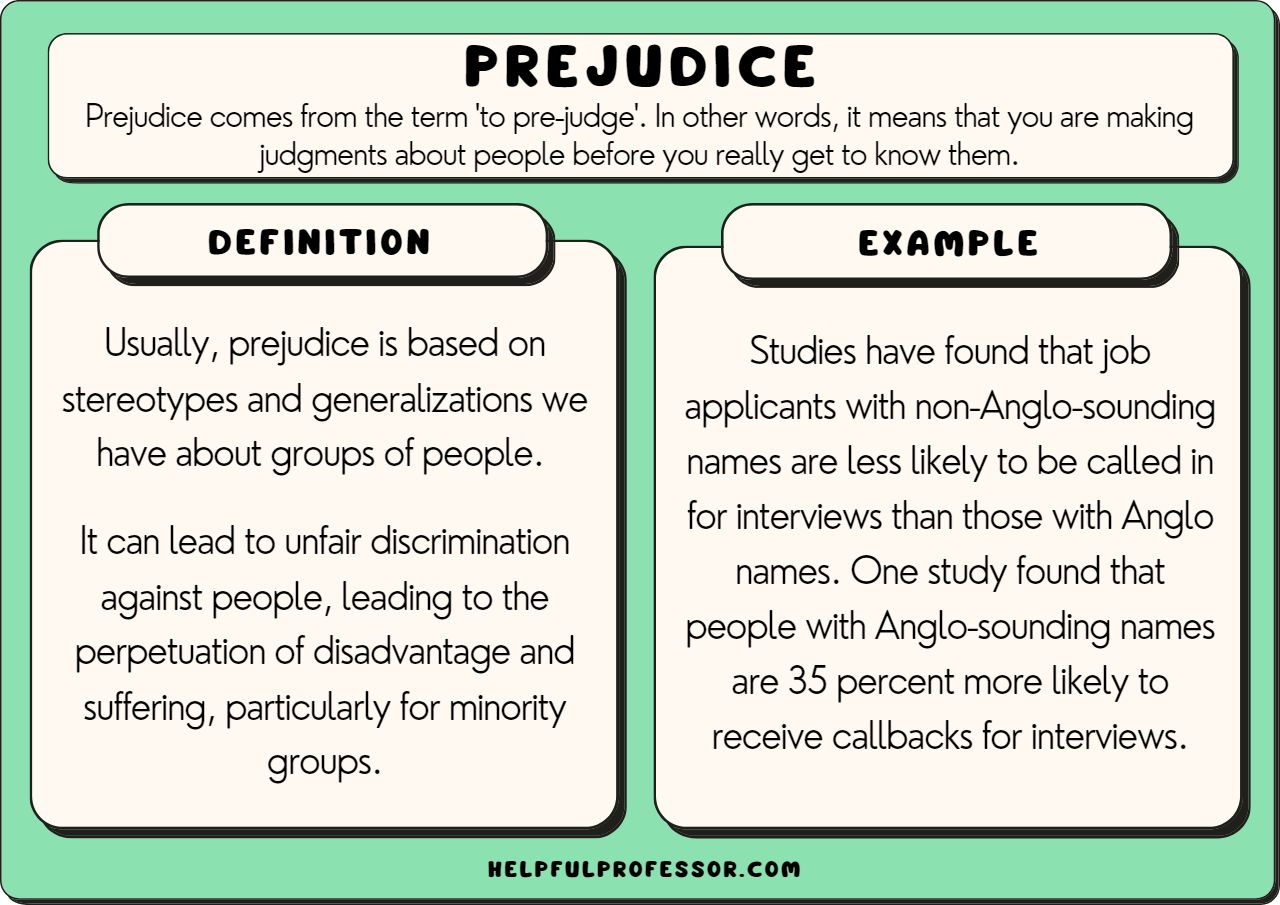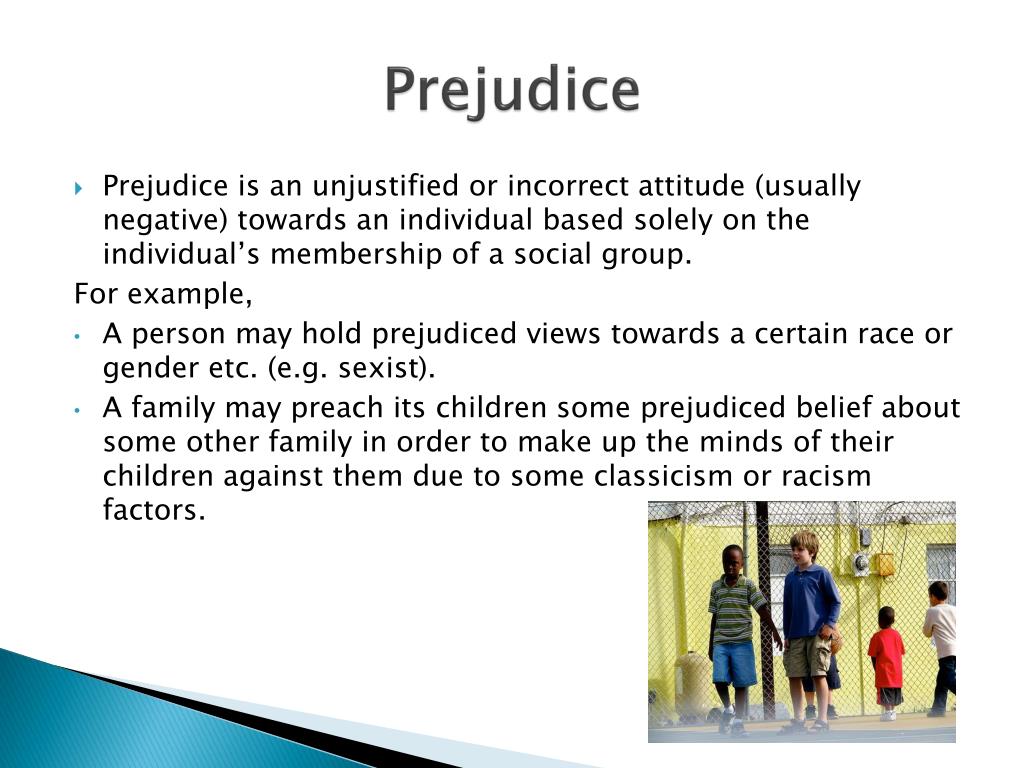Prejudice Meaning - Understanding Biased Views
Sometimes, people hold onto feelings or ideas about others without really knowing much about them. It's a rather common thing, you know, this idea of forming an opinion about someone or a whole group of people before you've even had a chance to get to know them properly. This kind of thinking, which is pretty much an unfriendly way of looking at things, can be aimed at a single person, a collection of people, or even a whole race, just based on what someone imagines them to be like.
You see, this way of thinking is often an unreasonable sort of feeling, or perhaps a viewpoint that just isn't fair. It comes about, quite often, without someone putting much thought into it, or without having enough real information to back it up. It’s like deciding something about a book just by looking at its cover, if that makes sense, or maybe even before you’ve seen the cover at all, which is a bit strange, really.
This whole idea, the core of what we call prejudice, is basically a leaning, a decided-beforehand notion, or a conviction about something. When a person acts on this kind of thinking, they’ve already made up their mind about a situation or a person, and they start making broad statements that apply to everyone, whether it fits or not. It's about how we form these fixed ideas about others, and how those ideas, perhaps, color our interactions.
Table of Contents
- What is the Core of Prejudice Meaning?
- How does a Preconceived Idea Shape Prejudice Meaning?
- When Do Feelings Become Prejudice Meaning?
- Unfair Judgments and Prejudice Meaning
- Can Prejudice Meaning Be Favorable?
- The Unjustified Nature of Prejudice Meaning
- How Does Prejudice Meaning Show Itself?
- Acting on Biased Views - Prejudice Meaning in Action
- The Legal Side of Prejudice Meaning
- Why Knowledge Matters for Prejudice Meaning
What is the Core of Prejudice Meaning?
At its heart, prejudice is a way of thinking that just isn't based on good sense. It's a mindset that carries unfriendly feelings, aimed directly at a person, a group of people, or even an entire race, simply because of qualities someone imagines them to possess. This unfriendly stance is, you know, usually without any real reason or before someone has gathered enough proof. It's characterized by ideas that put people in boxes, which are not based on logical thought, actually.
How does a Preconceived Idea Shape Prejudice Meaning?
When we talk about the idea of prejudice, we're often looking at a leaning or a belief that someone has already decided on, before they've truly considered the facts. It’s a bit like having a firm opinion about something or someone, without having much knowledge or even a good reason for it. This kind of decided-beforehand conviction can be about anything, really, and it shapes how someone sees the world around them. So, in a way, it's about making up your mind about things in advance.
When Do Feelings Become Prejudice Meaning?
Feelings can certainly take a turn toward prejudice when they become unfair and unreasonable. This happens, quite often, when these feelings or viewpoints are put together without enough thinking, or without a good base of information. For example, if someone has an unreasonable dislike for a certain group of people or certain things, or maybe they just prefer one group over another without a sensible reason, that’s when feelings start to become prejudice, you know, in a rather clear way.
Unfair Judgments and Prejudice Meaning
A key part of prejudice meaning involves making judgments that are simply not fair. These are opinions or feelings that have been made up beforehand, or without any true knowledge, careful thought, or sound reason. It's about having an unfavorable viewpoint that someone holds onto, perhaps, even when there's nothing to truly support it. This means the judgment is not based on facts, but rather on something else, like a gut feeling that isn't really justified, so to speak.
Can Prejudice Meaning Be Favorable?
It's interesting to consider that prejudice doesn't always mean a negative feeling. Sometimes, it can actually be a preference, a liking for one group of people or things over another, even if that preference isn't based on good sense. So, in some respects, it's about having any kind of decided-beforehand opinion or feeling, whether it leans towards being good or bad. This might seem a little counter-intuitive, but it's part of the broader definition, you know, in a way.
The Unjustified Nature of Prejudice Meaning
The core of prejudice, regardless of its direction, is that it’s an attitude or a viewpoint that isn't supported by good reasons. Typically, it’s a negative one, aimed at a person for something they have no control over. This could be their background, their gender, their age, or their beliefs, among other things. It's an unfriendly or even aggressive way of thinking towards a group or its individual members, generally without any fair grounds or enough proof. This type of thinking, you know, is often based on ideas that categorize people, which are not logical.
How Does Prejudice Meaning Show Itself?
Prejudice shows itself in various ways, often starting with those unpleasant emotions, ways of thinking, and beliefs directed toward individuals and groups. These are often based on ideas someone has already formed about things like someone's family background, their gender, their financial standing, their age, or their spiritual beliefs, and many other things. So, basically, it's about holding onto these fixed notions and letting them guide how you feel about people, which can be pretty impactful, you know.
Acting on Biased Views - Prejudice Meaning in Action
When a person acts based on prejudice, they’ve pretty much made up their mind about something or someone, and they start making sweeping statements about them. It's like saying everyone from a certain place behaves in a particular way, without actually knowing each person. This is an unreasonable dislike of a particular group of people or things, or a liking for one group over another, without a good reason. For instance, there was a situation where a person named Ghaffur apparently felt he was repeatedly treated unfairly because of this kind of thinking, which is a clear example, really.
The Legal Side of Prejudice Meaning
The concept of prejudice even pops up in legal situations, and it’s a pretty important consideration. If you cause someone to have a negative way of thinking towards another person, you are, in a way, prejudicing them. For example, people who work with the law are not allowed to bring certain kinds of information, like stories heard from others, into a trial. This is because such information could cause the people making decisions to have a negative view of someone without proper evidence, which is, you know, a very serious concern.
Why Knowledge Matters for Prejudice Meaning
Understanding prejudice means recognizing that it often comes from a lack of true knowledge, careful thought, or good reason. It's about opinions or feelings formed beforehand, without enough information. This is why getting to know people, learning about different ways of life, and really thinking things through can help to break down these decided-beforehand notions. It’s about moving past those ideas that put people in boxes and, you know, really seeing individuals for who they are, rather than what someone imagines them to be.
:max_bytes(150000):strip_icc()/what-is-prejudice-5092657_final1-a505ebebdef94eb18825740ee13c79eb.png)
The Psychology of Prejudice

17 Prejudice Examples (2025)

PPT - Prejudice PowerPoint Presentation, free download - ID:2600992